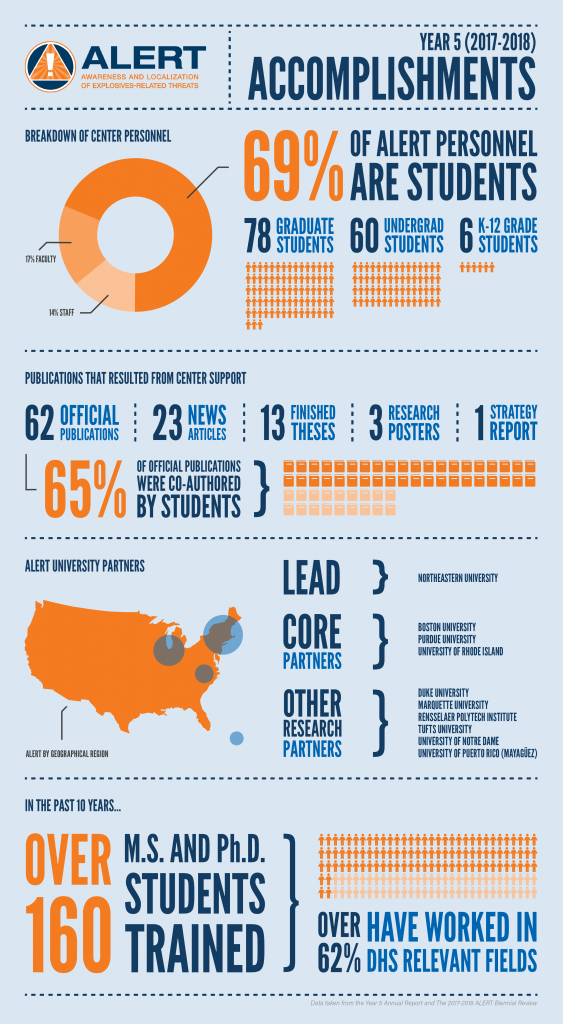News & Events
Student Central
ANSI Student Paper Competition 2020 – Papers Due April 30, 2020 October 31, 2019

The American National Standards Institute (ANSI) is holding a student paper competition in 2020, on the topic of STANDARDS SUPPORTING UNITED NATIONS SUSTAINABLE DEVELOPMENT GOALS. Papers are to be submitted to ANSI by April 30, 2020.
This competition will serve as a call to action for all countries of the world to promote health, safety, and prosperity while protecting the planet. To highlight the power of standards as a tool in these efforts, the American National Standards Institute (ANSI) 2020 Student Paper Competition asks students to choose one of the 17 UN Sustainable Development Goals and explore the ways in which standards play a role in achieving it, or could in the future. Papers should identify a relevant standard or multiple standards and discuss how they can contribute to strategies and solutions for reaching the targets set out in one of the Sustainable Development Goals. Read more about submission guidelines here.
Emily Belk Wins DHS COE Summit Grand Challenge Competition September 26, 2019
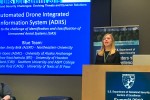
Computer Engineering and Computer Science BS student, Emily Belk was part of the winning team at the 2019 Department of Homeland Security (DHS) Centers of Excellence (COE) Summit Grand Challenge Student Competition held on July 31st at George Mason University in Arlington, Virginia. The DHS COE Summit is an annual event held to showcase the innovative research being conducted by the COE community as they work with industry partners and government collaborators and end-users to develop R&D tools and solutions to respond to the evolving threats and challenges facing the nation. Emily was attending the Summit as a student representative for the ALERT (Awareness and Localization of Explosives-Related Threats) COE led by Northeastern University and Director Michael B. Silevitch, Robert D. Black Professor in the Department of Electrical & Computer Engineering. Emily works as an undergraduate researcher on the ALERT project known as “Multi-Transmitter/Multi-Receiver Blade Beam Torus Reflector for Efficient Advanced Imaging Technology” led by ALERT Deputy Director, Professor Carey Rappaport.
The Grand Challenge Student Competition was designed to foster collaboration among the talented undergraduate and graduate students engaged in the research and work force development efforts within the COE community. Emily said, “The opportunity to work with students from different disciplines and centers of excellence to tackle the challenge at hand yielded many diverse and exciting ideas.”
With the goal of and emphasis on, developing innovative ways to approach homeland security concerns, diverse teams of multi-disciplinary COE students were formed to address this year’s Grand Challenge prompt which was to “identify an emerging threat to homeland security posed by Unmanned Aerial Systems (UAS) and develop a strategy to counter it. The student teams began brainstorming on the challenge on July 29thth and had to submit their final presentation and abstract by the evening of July 30th. “Having only 24 hours to define a problem, develop a solution, and create a presentation made for a very stimulating environment,” said Emily.
Emily led the final presentation for her team, including Tristan Goers from the University of Alaska Anchorage, Keshav Kasichainula from the University of Houston, Trinity Reed from Southern University and A&M College and Emiliano Ruiz from the University of Texas at El Paso which was entitled, “Automated Drone Integrated Information System (ADIIS).” ADIIS was envisioned to address the challenge in identifying and classifying UAS through a combination of registration incentives and tracking methods. An esteemed panel of judges, including leaders from DHS and industry, reviewed the presentations and selected Emily’s team, as the first place team of the five competing teams based on their innovative concept and articulate presentation.
“Our solution created a database that stored information about all drones flying in the U. S. airspace, and my favorite tool that we implemented was our Automated Point Evaluation System (APES). APES could calculate the perceived threat level of any drone”, said Emily. “We also implemented an APES precheck that, similar to TSA precheck, would allow trusted companies to purchase an initial stage of vetting in return for a more streamlined experience flying their commercial drones”.
Emily and her team received a first place certificate of recognition from William N. Bryan, Senior Official Performing the Duties of the Under Secretary for DHS S&T at the Grand Challenge Award Presentation and presented their winning proposal to the DHS Summit audience on August 1st.
Making Connections at ASPIRE 2019 March 27, 2019

March 28, 2019
This week, STEM students from ALERT’s academic partner institutions, and representatives from ALERT’s Industrial Members and government collaborators gathered together at Northeastern University for the Annual Student Pipeline Industry Roundtable Event (ASPIRE 2019). The aim of the ASPIRE series is to connect members of the industrial and government communities with qualified STEM students looking for internships, co-ops, and full-time jobs related to homeland security.
ASPIRE 2019 kicked off with welcoming remarks from Michael Silevitch (Director, ALERT), Emel Bulat (Senior Consultant for Corporate & Government Partnerships, ALERT), and Kristy Provinzano (Industry Liaison Associate, ALERT). Following this, ALERT Industry Members (American Science & Engineering, Rapiscan Systems, Raytheon, Smiths Detection) and representatives from the Department of Homeland Security and the U.S. Customs & Border Protection introduced student career opportunities at their respective organizations.
According to Adam Hutter, Laboratory Director at U.S. Customs and Border Protection’s New York Laboratory, “We’re constantly hiring, so we want to make sure we’re bringing in the best talent we can. The Department of Homeland Security has already invested heavily in these students through the Centers of Excellence pipeline, so it’s a resource we should utilize. These students have a leg up, because they’re already working on homeland security problems.”
ASPIRE 2019 featured both group and one-on-one meetings between students and representatives from industry and government. Many of the participants, like Jose Ruiz-Caballero who works on ALERT Project R3-C at the University of Puerto Rico Mayaguez, were ASPIRE returnees interested in jobs: “It’s a high impact event from my professional point of view, because you have direct contact with industry and government and they can provide you with a profile of what they’re looking for in a candidate.”
Molly Baldwin, a Purdue University undergraduate who works on ALERT Project R2-A.3 and is about to graduate is looking toward the future: “I started working on the research project last semester and fell in love with this industry. I’m here to see what jobs are out there for chemical engineers. I could see myself continuing to do research to improve the detection of explosives.”
For other students, the event is a great networking opportunity and a chance to gain experience speaking with job recruiters. First year student and first time ASPIRE attendee, Ian Hay, who does breast cancer detection research at Northeastern University, isn’t looking for a job quite yet, but found the event to be beneficial. According to Hay, “Communicating with different companies, both public and private, is valuable to me, especially in a low-pressure setting. Being able to meet with representatives and explain my work and how it applies to their industry is great practice.”
Since its establishment as a DHS Center of Excellence, ALERT has prioritized training the next generation of professionals to tackle explosives-related threats. Over the past 12 years, ALERT has trained over 160 graduate students, resulting in more than 100 of these professionals working in DHS-relevant fields. Events like ASPIRE 2019 are a significant part of ALERT’s mission to provide educational development to improve effective characterization, detection, mitigation and response to explosives-related threats facing the nation and the world.
Infographic: ALERT’s Year 5 (2017-2018) Accomplishments January 29, 2019
January 29, 2019
As we begin the New Year, we are also looking back on the previous year! Check out our newest infographic on ALERT’s Year 5 (2017-2018) Accomplishments.
Spring 2019: Upcoming ALERT Events November 29, 2018

Annual Student Pipeline Industry Roundtable Event (ASPIRE)
March 26, 2019
The Annual Student Pipeline Industry Roundtable Event (ASPIRE) will be held on March 26, 2019 at Northeastern University (Boston, MA). The ASPIRE is hosted by ALERT (Awareness and Localization of Explosives-Related Threats) & Gordon-CenSSIS (The Bernard M. Gordon Center for Subsurface Sensing and Imaging Systems). ASPIRE provides an optimal setting for dialogue between members of the academic, industrial, and government communities and also provides networking opportunities for students looking for internships, co-op experiences, and full-time jobs. ASPIRE is targeted at undergraduate and graduate students in the fields of engineering, science, and computer & information sciences who are interested in careers related to homeland security.
ALERT Technology Showcase and Research Review
May 14, 2019
ALERT will be hosting a Technology Showcase and Research Review on May 14, 2019 at Northeastern University (Boston, MA). This event will feature presentations and demonstrations of ALERT research results and tools from select ALERT projects. Attendees will also be able to interact with individual project researchers and collaborators to learn more about their research throughout the day.
Advanced Developments for Security Applications (ADSA20) Workshop
May 15-16, 2019
The twentieth Advanced Developments for Security Applications (ADSA20) Workshop will be held May 15-16, 2019 at Northeastern University (Boston, MA). Due to conflicts with other events, ALERT has changed the date previously provided. The theme of the workshop will be “Design, Development, Testing, Deployment and Operation of Effective Systems.” Topics that will be addressed include:
- Defining “effective”
- Effectiveness for other stakeholders: airlines and passengers
- Effectiveness for other venues: subway, rail, and cargo
- Human in the loop
- Positive predictive value improvement
- Detection versus deterrence versus displacement
- Role of interconnectivity with open architectures
- Correct operating point on the receiver operator characteristic curve
- Application of metadata
- Rapid response to an adapting adversary
- Managing the threat list
- Dealing with imperfect equipment
- Role of Artificial Intelligence
- Statistical significance of tests and influence of limited training data
- Application of simulants
- True versus auto-detection
- Data augmentation
- Transition – particularly from academia
- Reducing time to market
- Role of third parties
A formal invitation to register for the ADSA20 Workshop and the ALERT Technology Showcase and Research Review, along with the agenda and logistics information are forthcoming. These events are by invitation only. Please contact Tiffany Lam at [email protected] if you are interested in attending.
Advanced Developments Encompassing Processes and Technologies for Customs and Border Protection (CBP-ADEPT-02)
July 17-18, 2019
The second workshop on Advanced Developments Encompassing Processes and Technologies for Customs and Border Protection (CBP-ADEPT-02) will be held July 17-18, 2019 at Northeastern University (Boston, MA). The CBP-ADEPT-02 Workshop will address advanced development and processes for tomorrow with presentations and panel discussions on specific topics, such as:
- An adaptive adversary
- Integration of equipment and data
- Collection and use of meta-data
- Deterrence/hardening
- Insider threats
- Con-Ops
- Adaptation of TSA technologies
- Economics – incentives
- Simulation tools
- War gaming applications
A formal invitation to register for the event, along with the agenda and logistics information is forthcoming. You can find more information about the CBP-ADEPT workshops in the following link: https://alert.northeastern.edu/transitioning-technology/cbpadept/
Job Opportunity: United States Coast Guard November 29, 2018
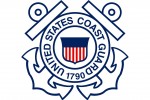
November 29, 2018
The United States Coast Guard (USCG) Research and Development Center (RDC) is looking for a qualified candidate to fill the job opening of “Interdisciplinary Position: General Research Engineer/ Physical Research Scientist/Operations Research Analyst” in New London, Connecticut. The chosen candidate will serve as a member on project teams that have the ultimate goal of helping the Coast Guard improve its effectiveness and efficiency through the introduction of innovative technologies, tools, methods, and concepts of operations. The deadline to apply for this position is December 6, 2018.
For more information about the position, please visit: https://www.usajobs.gov/GetJob/ViewDetails/517688300
ALERT REUs Deliver Final Presentations September 27, 2018
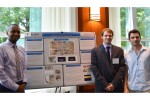
September 27, 2018
Summer is a time for soaking up the sun, but for seven ambitious undergraduate students who participated in ALERT’s 10-week long Research Experiences for Undergraduates (REU) Program, this summer was dedicated to ALERT research! At Northeastern University (NU), Anthony Englert (University of Massachusetts Amherst) and Samuel Kebadu (George Mason University) worked with Professor Carey Rappaport (Projects R3-A.2, & R3-A.3); and Alexis Costales (Washington University in St. Louis), Diego Rojas (NU), and Joe Von Holten (NU) worked with Professor Jose Martinez Lorenzo (Projects R3-B.1 & R3-B.2). At the University of Puerto Rico Mayagüez (UPRM), UPRM undergraduates, Samuel J. García-León and Roberto A. Rivera-De Jesús worked with Professor Samuel Hernandez (Project R3-C). The ALERT REU Program at NU collaborates with other REU programs in NU’s College of Engineering to build a cohort of students who jointly attend professional development meetings and program activities.
On August 9th, ALERT and Gordon-CenSSIS REUs based at NU delivered final presentations to friends, family, mentors, and professors on their project’s mission, their research contributions, and the knowledge and skills they gained from the program. The event kicked off at 9:00am with opening remarks from NU Professor David Kaeli (Electrical and Computer Engineering). A poster session was held at noon, where REUs shared posters they created, detailing their research contributions. During the session, faculty and mentors talked to each student about their work and judged them on three different categories: overall poster organization, research process presented clearly on poster, and oral presentation skills.
The event concluded with an award ceremony and closing remarks from Melanie Smith, REU Program Manager. Five students won an award for their posters including ALERT REUs, Anthony Englert and Sam Kebadu for their poster “Experimental Validation of a Multi-Static Imaging System for Concealed Threat Detection.” According to Professor Rappaport, “Anthony and Sam embraced the problem [focusing mm-waves for Advanced Imaging Technology] and were enthusiastically dedicated to solving it.”
If you are interested in hearing more about the experiences of past REU students, please check out ALERT’s short video: “ALERT Undergraduate Research in the AIT Lab at Northeastern University.”
Photo caption: REUs, Sam Kebadu and Anthony Englert, pose with their award winning poster and ALERT Postdoctoral Fellow, Mohammad Nemati.
Opportunities at Smiths Detection September 27, 2018
September 27, 2018
ALERT Industrial Partner, Smiths Detection has full-time positions available in both their Edgewood, Maryland (North of Baltimore) and Newark, California (San Francisco Bay Area) facilities.
Here are some links to specific job postings that Smiths Detection is searching for qualified candidates to fill:
Smiths Detection is also searching to fill a variety of other positions in the United States and abroad.
Summer 2018 REU Program July 31, 2018
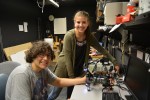
July 31, 2018
This summer, ALERT is hosting seven undergraduate students who are participating in the 10-week long Research Experiences for Undergraduates (REU) program. At Northeastern University, two students are working with Professor Carey Rappaport (Project R3-A.2, Project R3-A.3), and three students are working with Professor Jose Martinez Lorenzo (Project R3-B.1, Project R3-B.2). ALERT is also hosting two students at the University of Puerto Rico Mayagüez who are doing research with Professor Samuel Hernandez (Project R3-C), and one student at Duke University who is working with Professor Joel Greenberg (Project R1-C.3).
The ALERT REU Program at Northeastern University collaborates with other REU programs in the College of Engineering to build a cohort of students who jointly attend professional development meetings and program activities. At the end of the summer, each REU creates a research poster and presents a final presentation on their research project. These deliverables address the project’s overall mission and endeavors, the REU’s specific contributions to the project, as well as the knowledge and skills they gained from the experience.
If you are interested in hearing more about the experiences of past REU students, please check out our short video: “ALERT Undergraduate Research in the AIT Lab at Northeastern University.”
Caption: REU students, Diego Rojas and Alexis Costales, conduct research in Professor Jose Martinez Lorenzo’s laboratory at Northeastern University.
2018 DHS COE Summit Facilitates Collaboration and Advances DHS Mission July 31, 2018
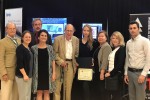
ALERT, along with other current and emeritus DHS Centers of Excellence (COEs), hosted the 2018 Centers of Excellence Summit in Arlington, Virginia on May 30-31, 2018. The event focused on the topic of “University Research and Development to Protect the Homeland.” The DHS COE Summit provided the Centers of Excellence an opportunity to showcase their innovative solutions to homeland security challenges and facilitate collaboration across homeland security enterprise leadership and component end-users and industry participants. According to ALERT Center Director, Michael B. Silevitch,
“One of the most valuable aspects of the Summit was the teamwork needed to pull it together. It required a concerted effort by all of the COEs to organize and orchestrate the event. Going forward, this teamwork will lead to meaningful cross-center collaboration.”
The agenda for the two-day long summit was launched with a keynote address from Christopher C. Krebs, Senior Official Performing the Duties of Under Secretary, National Protection and Programs Directorate (NPPD) and included talks by various security administrators, panel discussions, student posters, and a technology showcase.
Director Silevitch moderated a panel focused on “Transportation and Critical Infrastructure” on the first day of the summit. Panelists Carl Crawford, Eva Lee, David Nicol, and Detlof VonWinterfeldt addressed four questions related to this topic:
- What are some of the grand challenges that need to be addressed to enable the next generation of Homeland Security transportation and critical infrastructure solutions?
- What research needs to be done in order to address these challenges?
- How can the research outcomes be effectively transitioned to the field?
- What metrics can be used to enable a cost-benefit analysis of the research/transition impact?
ALERT’s Transition Team made connections with end users at the technology showcase and featured some of ALERT’s latest solutions in multi-view air cargo CT scanners, effective personnel screening, video tracking at the airport security checkpoint, and K9 explosives training aids.
COEs excel in advancing the state of the art thanks in large part to their student researchers. To acknowledge this, the summit provided students with the opportunity to present their work to attendees. Katherine Graham, one of ALERT’s talented undergraduate researchers, took home the Best Poster Award for her work on “Compressive Reflector Antennas for High-Sensing Capacity Imaging Applications.” These antenna designs provide a less complex and lower cost solution for high-sensing capacity millimeter wave imaging systems. Millimeter wave imaging systems have the potential for use in several near-field imaging applications such as security screening, non-destructive testing, autonomous driving, and biotechnology. The abstracts for the COE Summit student posters are available for download on the COE Summit 2018 website.
The summit provided an all-hands-on-deck approach to addressing homeland security challenges by bringing together some of the nation’s best academic, public, and private sector leaders to discuss strategies for advancing the mission of the Department of Homeland Security. ALERT looks forward to the next DHS COE Summit, and hopes you will join us there!

